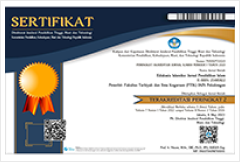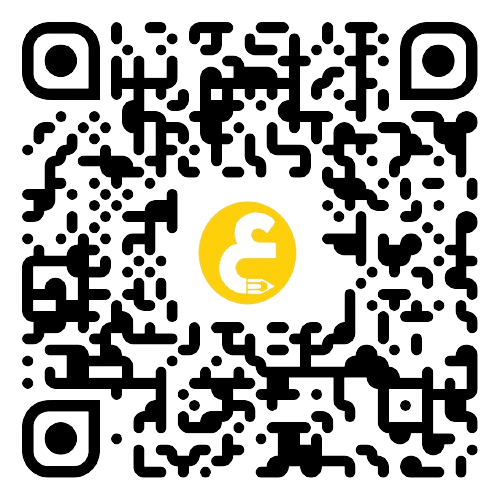Penyusunan Instrumen Analisis Pedagogical Content Knowledge Guru IPA Madrasah Tsanawiyah Terintegrasi Konten Islami
DOI:
https://doi.org/10.28918/jei.v3i2.1690Keywords:
Research Instrument, Pedagogical Content Knowledge, Islamic ContentsAbstract
An instrument for data collection needs to be analyzed before it is used in conducting research. The most pivotal characteristic of the instrument analysis exposes that researchers require to examine the validity and reliability. Pedagogical Content Knowledge (PCK) constitutes an academic construction that depicts an idea for stimulating individuals to learn. This present study aims to construct a PCK analysis-based research instrument for the natural science teachers of Islamic junior high schools, which is integrated with Islamic contents. A qualitative descriptive approach was employed in this study to explain the procedures for constructing the instrument. The procedures involved determining indicators, constructing a questionnaire as the research instrument, and measuring the validity, reliability, usability, and meaningfulness of the well-designed instrument. The research findings reveal that the development of the PCK analysis-based instrument dealt with three indicators, namely: knowledge of learners, knowledge of planning and designing, and knowledge of classroom instruction. Furthermore, the validity of the instrument demonstrated a positive result with minor revision, whereas the reliability with the Cronbach’s alpha coefficient showed that it was reliable. Meanwhile, considering the results of the usability and meaningfulness tests, it was attained that the PCK analysis-based instrument integrated with Islamic contents was commented at a very positive level.
References
Abdullah, S. I. S. S., & Halim, L. (2010). Development of instrument measuring the level of teachers’ Pedagogical Content Knowledge (PCK) in environmental education. Procedia - Social and Behavioral Sciences, 9, 174–178. https://doi.org/10.1016/j.sbspro.2010.12.131
Ali, F. (2018). Incorporating Values of Moderate Islam for the 21st Century Learners in an English as a Foreign Language Class. Edukasia Islamika, 3(1), 18-31.
Carlsen, W. S. (1999). Domains of teacher knowledge. Dalam J. Gess-Newsome & N. G. Lederman (Eds.), Examining Pedagogical Content Knowledge. Netherlands: Kluwer Academic Publishers.
Chapoo, S., Thathong, K., & Halim, L. (2014). Biology Teacher’s Pedagogical Content Knowledge in Thailand: Understanding & Practice. Procedia - Social and Behavioral Sciences, 116, 442–447. https://doi.org/10.1016/j.sbspro.2014.01.237
de Jong, O. (2009). Exploring and changing teachers’ pedagogical content knowledge: An overview. Dalam O. de Jong, & Lilia Halim. Teachers’ Professional Knowledge in Science and Mathematics Education: Views from Malaysia and Abroad. Selangor, Malaysia: Faculty of Education, Universiti Kebangsaan Malaysia.
Deng, Z. (2018). Pedagogical content knowledge reconceived: Bringing curriculum thinking into the conversation on teachers' content knowledge. Teaching and Teacher Education, 72, 155-164. https://doi.org/10.1016/j.tate.2017.11.021
Evens, M., Elen, J., Larmuseau, C., & Depaepe, F. (2018). Promoting the development of teacher professional knowledge: Integrating content and pedagogy in teacher education, Teaching and Teacher Education, 75, 244-258. https://doi.org/10.1016/j.tate.2018.07.001
Firdaos, R. (2017). METODE PENGEMBANGAN INSTRUMEN PENGUKUR KECERDASAN SPIRITUAL MAHASISWA. Edukasia: Jurnal Penelitian Pendidikan Islam, 11(2), 377–398. https://doi.org/10.21043/edukasia.v11i2.1782
Haryani, S., Prasetya, A. T., & Rusmawati, D. I. (2016). PEDAGOGICAL CONTENT KNOWLEDGE (PCK) CALON GURU DAN GURU KIMIA PADA MATERI BUFFER. Unnes Science Education Journal, 5(3). https://doi.org/10.15294/usej.v5i3.13185
Haryani, S., Wardani, S., & Prasetya, A. T. (2017). DEVELOPMENT OF CHEMSITRY TEACHER PROFESSIONALISM THROUGH PEDAGOGICAL CONTENT KNOWLEDGE TRAINING. Sainteknol: Jurnal Sains dan Teknologi, 14(2), 139–150. https://doi.org/10.15294/sainteknol.v14i2.8996
Heryanto, I., & Triwibowo, T. (2018). Path Analysis Menggunakan SPSS dan Excel: Panduan Pengelolaan Data Penelitian untuk Skripsi/Tesis. Bandung: Informatika.
Hsu, Y. S. (2015). Development of Science Teachers’ TPACK (1st ed.). Diperoleh dari http://b-ok.xyz/book/2550142/23d422/?_ir=1
Imaduddin, M., Hidayah, F. F., & Astuti, A. P. (2014). DESKRIPSI PEDAGOGICAL CONTENT KNOWLEDGE GURU KIMIA MENGGUNAKAN KOMPONEN MODEL PENTAGON. JURNAL PENDIDIKAN SAINS (JPS), 2(1), 26–35. https://doi.org/10.26714/jps.2.1.2014.26-35
Kabakci Yurdakul, I., Odabasi, H. F., Kilicer, K., Coklar, A. N., Birinci, G., & Kurt, A. A. (2012). The development, validity and reliability of TPACK-deep: A technological pedagogical content knowledge scale. Computers & Education, 58(3), 964–977. https://doi.org/10.1016/j.compedu.2011.10.012
Kunter, M., Klusmann, U., Baumert, J., Richter, D., Voss, T., & Hachfeld, A. (2013). Professional competence of teachers: Effects on instructional quality and student development. Journal of Educational Psychology, 105(3), 805–820. https://doi.org/10.1037/a0032583
Kusaeri, & Suprananto. (2012). Pengukuran dan Penilaian Pendidikan. Yogyakarta: Graha Ilmu.
Loughran, J., Berry, A., & Mulhall, P. (2012). Understanding and developing science teatchers’ pedagogical content knowledge. Clayton: Monash University.
Mardapi, D. (2007). Teknik Penyusunan Instrumen Tes dan Nontes. Yogyakarta: Mitra Cendikia Press.
Mulyani, F. (2009). KONSEP KOMPETENSI GURU DALAM UNDANG-UNDANG NOMOR 14 TAHUN 2005 TENTANG GURU DAN DOSEN (Kajian Ilmu Pendidikan Islam). Jurnal Pendidikan UNIGA, 3(1), 1–8.
Nurmatin, S., & Purwianingsih, W. (2017). Capturing The PCK Ability of Prospective Science Teachers Using Core and PaP-Er. Jurnal Pendidikan IPA Indonesia, 6(2), 271. https://doi.org/10.15294/jpii.v6i2.9507
Park, S., & Chen, Y.-C. (2012). Mapping out the integration of the components of pedagogical content knowledge (PCK): Examples from high school biology classrooms. Journal of Research in Science Teaching, 49(7), 922–941. https://doi.org/10.1002/tea.21022
Rollnick, M., Bennett, J., Rhemtula, M., Dharsey, N., & Ndlovu, T. (2008). The Place of Subject Matter Knowledge in Pedagogical Content Knowledge: A case study of South African teachers teaching the amount of substance and chemical equilibrium. International Journal of Science Education, 30(10), 1365–1387. https://doi.org/10.1080/09500690802187025
Scherer, R., Tondeur, J., & Siddiq, F. (2017). On the quest for validity: Testing the factor structure and measurement invariance of the technology-dimensions in the Technological, Pedagogical, and Content Knowledge (TPACK) model. Computers & Education, 112, 1–17. https://doi.org/10.1016/j.compedu.2017.04.012
Shulman, L. (1987). Knowledge and Teaching: Foundations of the New Reform. Harvard Educational Review, 57(1), 1–23. https://doi.org/10.17763/haer.57.1.j463w79r56455411
Siahaan, P. (2014). Evaluasi Pendidikan. Bandung: UPI Bandung.
Suh, J. K., & Park, S. (2017). Exploring the relationship between pedagogical content knowledge (PCK) and sustainability of an innovative science teaching approach. Teaching and Teacher Education, 64, 246–259. https://doi.org/10.1016/j.tate.2017.01.021
Surapranata, S. (2006). Analisis, Validitas, Reliabilitas, dan Interpretasi Hasil Tes: Implementasi Kurikulum 2004. Bandung: PT Remaja Rosdakarya.
Van Driel, J. H., & Berry, A. (2012). Teacher Professional Development Focusing on Pedagogical Content Knowledge. Educational Researcher, 41(1), 26–28. https://doi.org/10.3102/0013189X11431010
Yohafrinal, Damris, & Ristina. (2015). Analisis Pedagogical Content Knowledge (PCK) Guru MIPA di SMA Negeri 11 Kota Jambi. Jurnal Edu-Sains, 4(2), 15–24.






















